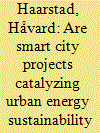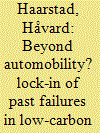|
|
|
Sort Order |
|
|
|
Items / Page
|
|
|
|
|
|
|
| Srl | Item |
| 1 |
ID:
166506


|
|
|
|
|
| Summary/Abstract |
The purpose of this paper is to investigate the links between smart cities and urban energy sustainability. Because achieving a “smart city” is a wide agenda rather than a specific set of interventions, smartness itself cannot easily be measured or quantifiably assessed. Instead, we understand smart cities to be a broad framework of strategies pursued by urban actors, and ask whether and how smart city projects catalyze urban energy sustainability. We use case studies of three cities (Nottingham, Stavanger, and Stockholm) funded by the Horizon 2020 Smart Cities and Communities program and examine how urban energy sustainability was advanced and realized through the smart city initiatives. We find first that while sustainability is not always a major objective of local implementation of smart city projects, the smartness agenda nevertheless increases the ambition to achieve energy sustainability targets. Second, the sustainability measures in smart cities are rarely driven by advanced technology, even though the smart city agenda is framed around such innovations. Third, there is significant sustainability potential in cross-sectoral integration, but there are unresolved challenges of accountability for and measurability of these gains.
|
|
|
|
|
|
|
|
|
|
|
|
|
|
|
|
| 2 |
ID:
186419


|
|
|
|
|
| Summary/Abstract |
Automobility, including the infrastructures, technologies and institutions that created high dependence on private car use, has led to significant environmental and climate problems and notably high carbon emissions. Now cities are attempting to move beyond this failed regime by experimenting with a range of different mobility innovations. In this paper, we examine whether emergent policy-led experiments and innovation processes in low-carbon mobility are learning from the past, or whether they are reproducing key elements of past policy failures. Through four case studies – Birmingham, Stavanger, Milton Keynes and Melbourne – we assess attempts to break out of high-carbon automobility through three key factors, namely diversification of travel options, a shift from individual to shared forms of mobility, and whether these aspects are implemented at scale. We find that while all cities show potential for diversification and sharing at scale, current modes of innovation exhibit features that may reproduce rather than reduce high-carbon automobility. Our analysis attributes this risk of continued failure to how policy-led experimentation and innovation are structured and themselves become locked in, thereby upholding the obdurate automobility regime.
|
|
|
|
|
|
|
|
|
|
|
|
|
|
|
|
|
|
|
|
|